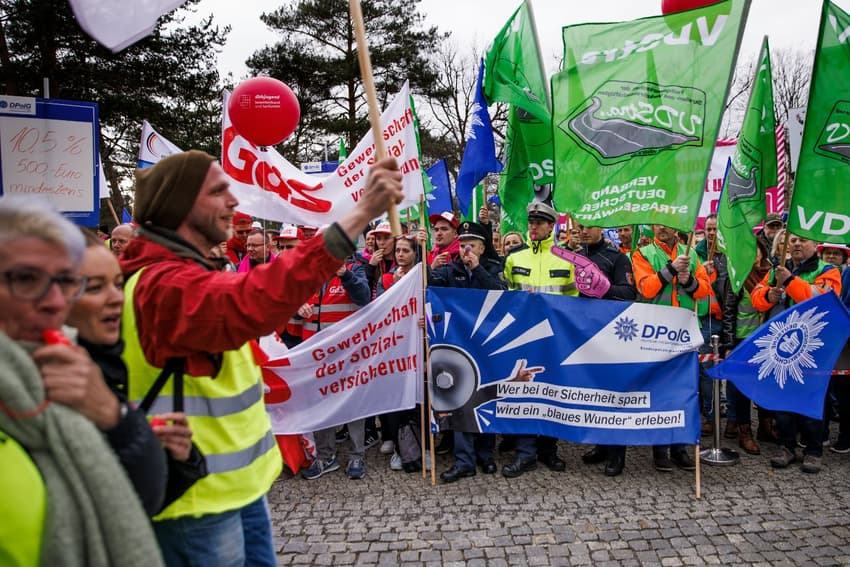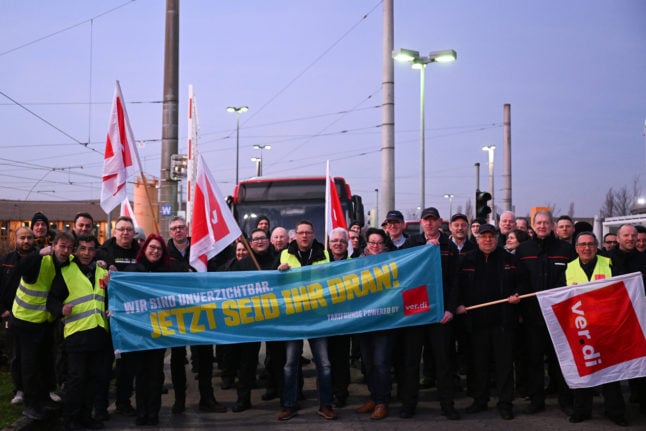More strikes planned as German union rejects public sector pay deal

Another set of warning strikes is due to take place at Düsseldorf Airport and in the Cologne/Bonn region on Monday as German union Verdi described a potential pay deal as a "distant prospect".
The strikes in North Rhine-Westphalia will take place across the public sector, meaning public transport services around Cologne, Bonn and Leverkusen will be severely limited and nursery schools may also be closed.
Those hoping to fly out of either of NRW's two major airports should also expect disruption. Services union Verdi has called on its members to stage a walkout at Cologne airport on Sunday evening, with a similar action at Düsseldorf Airport due to start shortly afterwards.
Both strikes are scheduled to end on Monday night or early on Tuesday morning.
The planned industrial action comes hot on the heels of a massive strike action at seven airports across Germany. Around 2,000 flights were cancelled and around 300,000 passengers were unable to travel due to the February 17th walkout.
Verdi said the strike action had been announced well in advance so passengers could make other plans and that it had designed the walkout so as not to affect victims of the earthquakes in Turkey and Syria or Munich Security Conference attendees.
"With the strikes, the workers are jointly putting pressure on the respective employers, because no acceptable offer has been made in the public service negotiations so far," explained Andrea Becker, regional section leader of Verdi in NRW.
READ ALSO: More than 2,000 flights cancelled in Germany as airport workers strike
'Disappointment and resentment'
Major public sector strikes have also been taking place in North Rhine-Westphalia, Hesse, Schleswig-Holstein and Berlin in recent weeks as unions fight for pay rises in line with inflation.
In the first few weeks of February, Kitas were closed, public transport and city administration ground to a halt and hospitals ran limited operations. Police and postal workers have also been on strike.
There was hope that the wave of strikes would come to an end following negotiations between government representatives and the unions on February 22nd and 23rd.
However, in a statement sent out immediately after the talks had concluded, Verdi announced that a deal between parties was still unattainable.
"The employers' offer, in terms of amount, duration and lack of social compensation, is causing disappointment and resentment among the workers. People feel this is disrespectful and will not accept it," said Verdi president Frank Werneke.
"The employers are not solving the wage dispute with the content of their offer. As a consequence, the warning strikes will be extended."
Employers had allegedly put forward a deal that included a one-time bonus payment of €2,500 and a two-stage pay increase amounting to five percent over 27 months.
Werneke said the offer was insufficient given that prices would remain at a high level long after employees has used up their one-time bonus.
The previous strikes on behalf of the some 2.5 million workers across the public sector had clearly not been enough to make employers think, he added. "In that case, we will step it up a notch."
READ ALSO: Disruption to public transport and Kitas as workers around Germany go on strike
 Striking workers at a tram depot in Düsseldorf. Photo: picture alliance/dpa | Federico Gambarini
Striking workers at a tram depot in Düsseldorf. Photo: picture alliance/dpa | Federico Gambarini
To compensate for soaring inflation, Verdi is demanding a 10.5 percent pay increase for federal and local government employees - and at least an extra €500 per month for the coming year.
If successful, this would provide a pay hike for civil servants, judges, soldiers and pension recipients alike.
The union has banded together with a series of other major public sector unions in Germany in order to place pressure on the government. The next round of negotiations is scheduled on 27th and 29th March in Potsdam.
READ ALSO: PODCAST: How bad will strikes get in Germany and should public officials have to speak English?
Comments
See Also
The strikes in North Rhine-Westphalia will take place across the public sector, meaning public transport services around Cologne, Bonn and Leverkusen will be severely limited and nursery schools may also be closed.
Those hoping to fly out of either of NRW's two major airports should also expect disruption. Services union Verdi has called on its members to stage a walkout at Cologne airport on Sunday evening, with a similar action at Düsseldorf Airport due to start shortly afterwards.
Both strikes are scheduled to end on Monday night or early on Tuesday morning.
The planned industrial action comes hot on the heels of a massive strike action at seven airports across Germany. Around 2,000 flights were cancelled and around 300,000 passengers were unable to travel due to the February 17th walkout.
Verdi said the strike action had been announced well in advance so passengers could make other plans and that it had designed the walkout so as not to affect victims of the earthquakes in Turkey and Syria or Munich Security Conference attendees.
"With the strikes, the workers are jointly putting pressure on the respective employers, because no acceptable offer has been made in the public service negotiations so far," explained Andrea Becker, regional section leader of Verdi in NRW.
READ ALSO: More than 2,000 flights cancelled in Germany as airport workers strike
'Disappointment and resentment'
Major public sector strikes have also been taking place in North Rhine-Westphalia, Hesse, Schleswig-Holstein and Berlin in recent weeks as unions fight for pay rises in line with inflation.
In the first few weeks of February, Kitas were closed, public transport and city administration ground to a halt and hospitals ran limited operations. Police and postal workers have also been on strike.
There was hope that the wave of strikes would come to an end following negotiations between government representatives and the unions on February 22nd and 23rd.
However, in a statement sent out immediately after the talks had concluded, Verdi announced that a deal between parties was still unattainable.
"The employers' offer, in terms of amount, duration and lack of social compensation, is causing disappointment and resentment among the workers. People feel this is disrespectful and will not accept it," said Verdi president Frank Werneke.
"The employers are not solving the wage dispute with the content of their offer. As a consequence, the warning strikes will be extended."
Employers had allegedly put forward a deal that included a one-time bonus payment of €2,500 and a two-stage pay increase amounting to five percent over 27 months.
Werneke said the offer was insufficient given that prices would remain at a high level long after employees has used up their one-time bonus.
The previous strikes on behalf of the some 2.5 million workers across the public sector had clearly not been enough to make employers think, he added. "In that case, we will step it up a notch."
READ ALSO: Disruption to public transport and Kitas as workers around Germany go on strike

To compensate for soaring inflation, Verdi is demanding a 10.5 percent pay increase for federal and local government employees - and at least an extra €500 per month for the coming year.
If successful, this would provide a pay hike for civil servants, judges, soldiers and pension recipients alike.
The union has banded together with a series of other major public sector unions in Germany in order to place pressure on the government. The next round of negotiations is scheduled on 27th and 29th March in Potsdam.
READ ALSO: PODCAST: How bad will strikes get in Germany and should public officials have to speak English?
Join the conversation in our comments section below. Share your own views and experience and if you have a question or suggestion for our journalists then email us at [email protected].
Please keep comments civil, constructive and on topic – and make sure to read our terms of use before getting involved.
Please log in here to leave a comment.